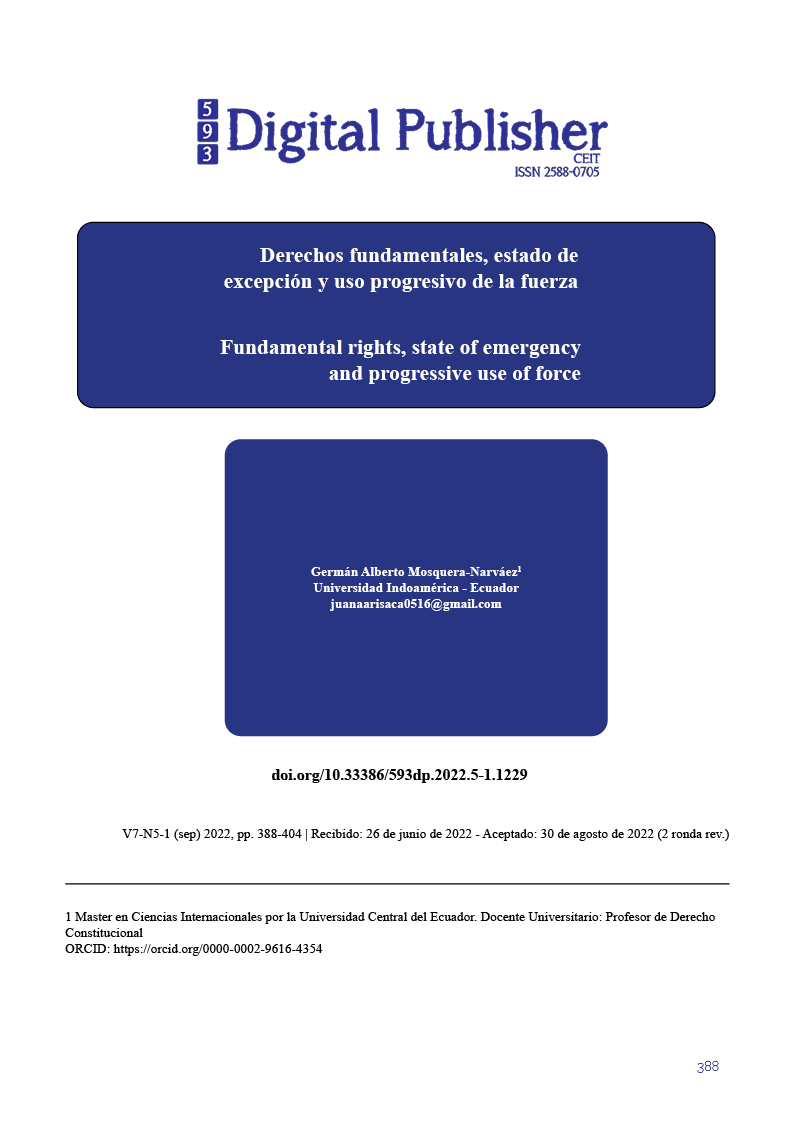Fundamental rights, state of emergency and progressive use of force. An approach to political and jurisdictional controls in the constitutional State
Main Article Content
Abstract
This research collects dogmatic, normative, and jurisprudential contributions related to progressive use of public force, the protection of fundamental rights, and declaration states of exception as a prerogative of the States. It focuses on determining the nature and characteristics of these institutions, as well as developing, from theory and practice, regarding the different types of controls and limits related for political and jurisdictional; for this aspect, it examined Judgment No. 33-20 IN/21 of the Ecuadorian Constitutional Court, which, through the exercise of constitutional control, declared unconstitutionality due to the form and substance regarding regulations issued by the Ministry in charge of the Armed Forces, since these establish restrictions on fundamental rights by authorizing the progressive use of force during states of exception, in that sense, according to the nature, scope, powers and limitations that States have for the use of force during states of emergency, discussing the dichotomy between, on the one hand, legitimately addressing critical social situations, and on the other, the abuse of power by the State and the consequent violation of rights; therefore, it is proposed to answer the following research question: If the main doctrinal, normative and jurisprudential contributions that show limits and controls to the State regarding the use of public force within states of exception, are observed and respected by the framework institutional at Equator country?
Downloads
Article Details

This work is licensed under a Creative Commons Attribution-NonCommercial-ShareAlike 4.0 International License.
1. Derechos de autor
Las obras que se publican en 593 Digital Publisher CEIT están sujetas a los siguientes términos:
1.1. 593 Digital Publisher CEIT, conserva los derechos patrimoniales (copyright) de las obras publicadas, favorece y permite la reutilización de las mismas bajo la licencia Licencia Creative Commons 4.0 de Reconocimiento-NoComercial-CompartirIgual 4.0, por lo cual se pueden copiar, usar, difundir, transmitir y exponer públicamente, siempre que:
1.1.a. Se cite la autoría y fuente original de su publicación (revista, editorial, URL).
1.1.b. No se usen para fines comerciales u onerosos.
1.1.c. Se mencione la existencia y especificaciones de esta licencia de uso.
References
Agamben, G. (2007). Estado de excepción (2da ed.). Adriana Hidalgo editora.
Constitución de la República del Ecuador, (2008) (testimony of Asamblea Constituyente).
Ley de Seguridad Pública del Estado, (2009) (testimony of Asamblea Nacional Ecuador).
Ley Orgánica de Garantías Jurisdiccionales y Control Constitucional, (2009) (testimony of Asamblea Nacional Ecuador).
Casal, J. M. (1999). Los estados de excepción en la Constitución de 1999. Revista de Derecho Constitucional., 1, 45-54.
Castillo Córdova, L. (2008). Los derechos fundamentales no se suspenden ni se restringen en un régimen de excepción. Revista de Derecho, Universidad de Piura.
Montero Aranguren y otros (Retén de Catia) vs. Venezuela, Sentencia, serie C (Corte Interamericana de Derechos Humanos 2006).
Comité Internacional de la Cruz Roja. (2014). Violencia y uso de la fuerza. CICR.
Sentencia No. 33-20-IN y acumulados, (Corte Constitucional 2021).
Caso Zambrano Vélez y otros Vs Ecuador, Sentencia Serie C No. 166 (CIDH 2007).
Nadege Dorzema y otros vs. República Dominicana, (2012).
Diamint, R. (2018). ¿Quién custodia a los custodios? Democracia y uso de la fuerza en América Latina. Nueva Sociedad, noviembre-diciembre de 2018(No 278). https://static.nuso.org/media/articles/downloads/1.TC_Diamint_278.pdf
Ferrajoli, L., Víctor Abramovich, María José Añón, & Christian Courtis. (2001). Estado Social y Estado de Derecho, en Derechos sociales. Instrucciones de uso. (1.a ed.). Distribuciones Fontamara.
Fix-Zamudio, H. (2004). Los estados de excepción y la defensa de la Constitución. Boletín Mexicano de Derecho Comparado, 37(111), 801-860.
Gabaldón, L., & Birkbeck, C. (1998). Criterios situacionales de funcionarios policiales sobre el uso de la fuerza física. Univeridad del Zulia. Capítulo Criminológico, Vol 6(2), 99-132.
González Calleja, E. (2006). Sobre el concepto de represión. 1(6), 551-580.
Lopera Mesa, G. P. (2011). Principio de proporcionalidad y control constitucional de las leyes penales: Una comparación entre las experiencias de Chile y Colombia. Revista de Derecho (Valdivia), 24(2), 113-138. https://doi.org/10.4067/S0718-09502011000200005
Martínez, F. (2016). Investigación Aplicada. Uso de la fuerza. CESC, Universidad de Chile. https://www.cesc.uchile.cl/publicaciones/dt_04_usodelafuerza.pdf
Meléndez Padilla, F. (2003). Los derechos fundamentales en los estados de excepción según el Derecho internacional de los derechos humanos [Tesis]. Universidad Complutense de Madrid.
Melo, R. (2015). El estado de excepción en el actual constitucionalismo andino [Tesis, Universidad Andina Simón Bolívar, Sede Ecuador]. http://hdl.handle.net/10644/4910
Mosquera-Narváez, G., & Alvarado-Alvarado, E. (2021). Derecho a la salud y estado de excepción en tiempos de COVID 19. 593 Digital Publisher CEIT, 6(5-1), 276-291. https://doi.org/10.33386/593dp.2021.5-1.774
Oyarte Martínez, R. (2014). Derecho constitucional ecuatoriano y comparado (Edición primera). Corporación de Estudios y Publicaciones.
Pfeffer Urquiaga, E. (2002). Estados de excepción constitucional y reforma constitucional. Ius et Praxis, 8(1). https://doi.org/10.4067/S0718-00122002000100013
Sagués, N. (1990). Derecho Constitucional y derecho de emergencia. Ius et Praxos.
Schmitt, C. (1968). La dictadura. Desde los comienzos del pensamiento moderno de la soberanía hasta la lucha de clases proletaria. Revista de Occidente, 344 pp.
Solá, J. V. (2006). Derecho Constitucional (2006.a ed.). Abeledo-Perrot.
Tórtora Aravena, H. (2010). Las limitaciones a los derechos fundamentales. Estudios Constitucionales, 8(2), 167-200. https://doi.org/10.4067/S0718-52002010000200007
Weber, M., & Aron, R. (1996). El pol??tico y el cient??fico. Alianza.


